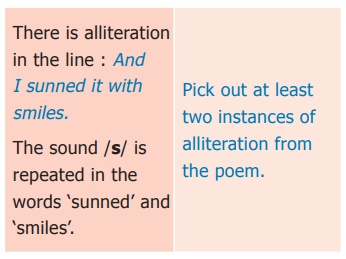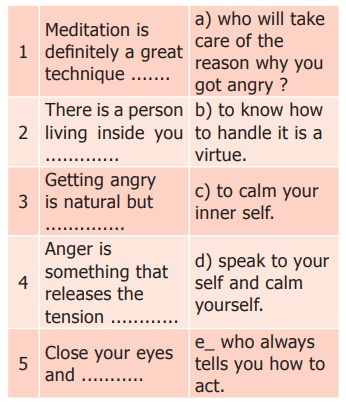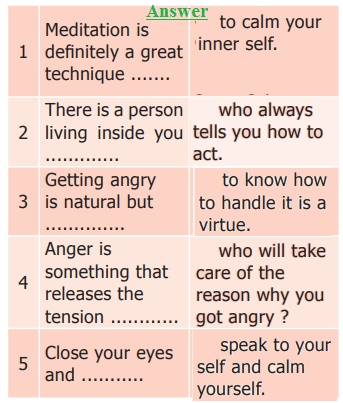English : Unit 2 : Poem : A Poison Tree – by William Blake
Warm Up
A. Choose the option that suits your own behavior in the given situations. Compare your answers with your partner’s answers.
1. You overhear a friend talking badly about you. How angry does that make you feel?
I don’t feel angry at all.
I feel moderately angry.
I feel slightly annoyed.
I feel very angry.
I feel a little angry.
I feel furious.
2. Your friend persuades you to take help to prepare for the Maths board examination, from a close friend. That person does not turn up at all, as agreed. How angry does that make you feel?
I don’t feel angry at all.
I feel moderately angry.
I feel slightly annoyed.
I feel very angry.
I feel a little angry.
I feel furious.
3. You have agreed to pick up some friends at the train station. They are coming to stay with you for a few days. You’ve arranged with your elder brother/ sister to drive the car for the day. You are about to leave the house when you realise the car is outside but your brother/ sister has gone to work, taking the keys!. How angry does that make you feel?
I don’t feel angry at all.
I feel moderately angry.
I feel slightly annoyed.
I feel very angry.
I feel a little angry.
I feel furious.
4. During a get together, your friend makes fun of your singing in front of your friends. You thought your singing was fine, but your friend thinks you really need to practise much more. How angry does that make you feel?
I don’t feel angry at all.
I feel moderately angry.
I feel slightly annoyed.
I feel very angry.
I feel a little angry.
I feel furious.
B. Answer the following questions. Share your views with the class
* Do you argue often with your classmates ?
Yes I do, I am the first person to apologize to them.
* Do you forgive them or choose to remain enemies forever?
I forgive my classmates. I don’t consider them my enemies.
* How long does your anger last?
My anger last for oneday. I forgive my friends or apologize to them, if it is my mistake.
Glossary
wrath (n.) – anger
foe (n.) – enemy
deceitful (adj.) – cunning, treacherous
wiles (n.) – tricks
veiled (v.) – covered
A. Answer the following questions in a sentence or two.
1. I was angry with my friend
I told my wrath, my wrath did end.
a. Whom does ‘I’ refer to?
‘I’ refer to the Poet.
b. How did the anger of the poet come to an end?
The poet told his anger properly. So anger came to an end.
2. And I watered it in fears
Night and morning with my tears;
a. What does ‘it’ refer to?
It refers to the seed [wrath]
b. How is ‘it’ watered?
It is watered with tears.
3. In the morning glad I see
My foe outstretched beneath the tree
a. How did the poet feel in the morning?
The poet was glad to see it in the morning
b. Who is the ‘foe’ referred to here?
Satan is the foe referred to here.
c. Why was the ‘foe’found lying outstretched beneath the tree?
The foe was dead. So he was found to be so.
4. And it grew both day and night,
Till it bore an apple bright.
a. What does ‘it’ refer to?
It refers to the tree/plant of anger
b. What does ‘apple’ signify?
Apple signifies wrath
c. What grew both day and night?
The tree grew both day and night.
B. Complete the summary by filling in the given spaces with suitable words.
Once the poet was angry with his friend He expressed his (i) wrath or anger and it ended. They became friends. But when he grew angry with his foe, he (ii) did not tell it and allowed his anger to grow. Day and night he watered it with his tears and allowed it to grow. He (iii) sunned his foe with false smiles and cunning tricks. The tree kept growing and yielded a bright apple which (iv) beheld his foe to eat it stealthily during the night. The next morning the poet was happy to see his foe lying (v) out stretched under the tree.
C. Answer the following questions in about 80-100 words.
1. How did the poet’s anger with his friend end?
Poem : A Poison Tree
Author : Ruskin Bond
Character : Poet, his friend and enemy, tree
Theme : Enmity dies hard
The poet tells about a friend and an enemy. He was angry with both of them. But he told his friend that he was angry and why he was so. Due to some reasons it might have happened. But the poet had love for his friend. He approached his friend. He could become easy and smooth. They could strengthen their friendship. Anger disappeared from their minds. The poet told his friend his extreme anger. The displeasure vanished in no time. Love defeated enmity. Enmity could not grow anymore.
“Love Your enemies”
2. Describe how his anger kept growing.
Poem : A Poison Tree
Author : Ruskin Bond
Character : Poet, his friend and enemy, tree
Theme : Grow love but not enmity
The poet encountered with his enemy. But he was very careful not to tell him his anger. He allowed his anger to grow. He watered it regularly. It grew into a tree. It blossomed and began to bear a fruit. The poet pretended to be friendly. But he sunned the tree only with false love. The poet made his attitude more attractive. His aim was only to defeat his enemy and kill him finally. The poet was keen on his aim. His anger kept growing as a tree robustly.
“Grow love and throw enmity”
3. Describe the effect of the poisonous fruit on the ‘enemy’.
Poem : A Poison Tree
Author: Ruskin Bond
Character: Poet, his friend and enemy, tree
Theme: Love your enemies too
The scene begins with the poet and his enemy. The poet was angry with his enemy. He had no mind to tell his enemy about his anger. The anger was like a seed. He watered it and it grew well. It became a tree. He sunned with his smile. The tree blossomed and brought forth a fruit. It attracted the enemy. He chose the night to steal it and eat it. The next morning the enemy was found lying dead. The anger kept on growing till the end. The poet grew the poison tree with an aim to kill the enemy. The fruit proved its worth. The enemy was killed. The poet became happy.
“Love forgives and covers all sins”
COMMON PARAGRAPH
PARAGRAPH FOR TOPPERS:
Synopsis:
• Introduction
• Anger with a friend
• Anger with an enemy
• The fruit of anger
• Conclusion
Introduction:
The poem “A Poison Tree” was written by William Blake. He was an English poet, painter and print maker. This poem is about suppressing anger and its results.
Anger with a friend:
The speaker is angry with his friend. There is no need to worry. He told his friend about his anger. Hence his anger ends. Their friendship continues.
Anger with an enemy:
The poet gets angry with his enemy. He kept his anger in his mind. The anger grows. It grows only by his fears. The poet watered the tree with his tears. His false smiles root in his heart.
The fruit of anger:
Like a poison tree, his anger grows day and night. One day it begins to bear a fruit. The fruit is a bright apple. His enemy saw the shining apple. The enemy entered into the speaker’s garden. He wants to taste the fruit. As it was a poisonous fruit it killed him. The speaker was happy to see the sight.
Conclusion:
The speaker seems to be glad the next morning. The speaker killed his enemy. The poet tells us anger suppressed is anger increased.
PARAGRAPH FOR AVERAGE STUDENTS:
Poem : A Poison Tree
Author : Ruskin Bond
Theme : Love your enemies too
The speaker is angry with his friend. There is no need to worry. He told his friend about his anger. Hence his anger ends. Their friendship continues. The poet gets angry with his enemy. He kept his anger in his mind. The anger grows. A poison tree of anger took root in his heart. The poet watered the tree with his tears. At last the tree produced a fruit. The enemy entered into the speaker’s garden. He tempted his enemy to eat it. As it was a poisonous fruit it killed him. The speaker was happy to see the sight.
PARAGRAPH FOR LATE BLOOMERS:
• The speaker is angry with his friend.
• He told his anger.
• Hence his anger ends.
• The speaker is angry with his enemy.
• He kept his anger in his mind.
• The anger tree grows.
• It yielded a bright fruit.
• It tempted his enemy to eat it.
• The speaker found his enemy dead.
Poem appreciation
D. Figures of Speech

i. I was angry with my foe
The words ‘was’ and ‘with’ are in alliterated (The sound /w/ is repeated)
ii. Till it bore an apple bright
The words ‘bore’ and ‘bright’ are in alliterated (The sound /b/ is repeated)
iii. Night and morning with my tears
The words ‘morning’ and ‘my’ are in alliterated (The sound /m/ is repeated)
iv. And with soft deceitful wiles
The words ‘with’ and ‘wiles’ are in alliterated (The sound /w/ is repeated)
E. Read the following lines from the poem and answer the questions that follow.
1. I was angry with my friend;
I told my wrath, my wrath did end.
I was angry with my foe
I told it not, my wrath did grow.
i. Pick out the rhyming words.
The rhyming words are “friend, end” and “foe, grow”
ii. What is the rhyme scheme of the stanza?
The rhyme scheme is “aabb”
iii. Identify the figure of speech in the title of the poem.
The figure of speech is “metaphor”
2. And I water’d it in fears
Night and morning with my tears;
i. What figure of speech is used in ‘watered it in fears’?
The figure of speech used here is a ‘metaphor’
Listening
F. Listen to the passage on ‘anger management’ and match the sentence parts by drawing a line. The recording can be played more than once if needed.
Listening input for Anger Management
It’s natural to get angry. But it’s a virtue to know how to handle it. It deals with certain anger management issues .Here are some of the best anger management tips to help you get over being angry quickly.
Meditation is definitely a great technique to calm your inner self, thereby controlling those sudden angry outbursts. Meditation does not always require that you sit in a place and keep peeping at the watch. You need a peaceful place to sit upright.
Start relaxing with the top of your head and then slowly release the tension of your body, one muscle at a time and breathe deeply.
Try to connect yourself with your inner person. There is a person living inside you who always tells you how to act. After a strong situation, it is you that inner person who understands you better than anyone else. So initiate a positive conversation within yourself. Close your eyes and speak to yourself and calm yourself.
Anger is something that releases the tension you have been feeling all the while but who will take care of the reason why you got angry in the first place? It is as simple as a solution that you need. Forgive and forget It’s easier to get the apologies over and done with right away so you can forget about your anger and move on.
Start good one by saying , “I’m sorry” or “I forgive you”. Forgiving is a blessing. Spread the goodness. Instead of allowing others to laugh at you, laugh at yourself. Think of all the words you said and think of how you could have changed the situation by acting in a different way.

Answers: l.c) ; 2.e) ; 3.b) ; 4.a) ; 5.d)

Think and Write
G. Answer the following in about 80-100 words. Take ideas from the poem and also use your own ideas.
1. Recall a recent situation when you became angry. What were the consequences of your anger? After listening to the guidelines on anger management, find out how well you could have handled the situation. Write your findings.
Anger is often viewed by the public as a feeling related to evil. However, it is actually an innate feeling that every individual feels once in a while. No one can escape this feeling. Even small children became angry from time to time.
• It is important to recognize when you feel angry.
• Never try to suppress your anger but try to understand it.
• When we sleep, the body and mind rest and rebuild damaged cells and neural pathways.
• Regular physical exercises can keep oneself fit.
2. What might have caused the conflict which led to the poet becoming angry with his enemy? Think of one such situation that you have experienced. Describe how you felt and how the enmity grew and things became worse.
In the poem ‘A poison tree’ the poet is not satisfied to wait for his enemy to die. But he wants to kill him using deceit. Everyone knew a bully or had an enemy when they were growing up . There is enmity between individuals, groups, countries etc. The love of hating paves way to enmity. Enmity grows because of jealousy, greed, pride and arrogance, disloyalty and intolerance. Things become worse when enmity grows. Enmity is a result of all evils. It leads to hatred and aversion. Enmity destroys the virtues of man. It affects the good character of oneself. It makes anyone very selfish. It cheers up at the defeat and death of the enemy. Thus the things become worse when the enmity grows.
H. Discuss and Write.
1. Identify five to six qualities which make an ordinary person, loved and respected by all. Work in groups of five or six. Each group has to take up one quality and discuss the methods for imbibing that quality and identify the challenges that need to be faced.
Six qualities which make an ordinary person, loved and respected by all
1. Politeness
2. Listening
3. Helpfulness
4. Avoiding excuses
5. Adapting to changes
6. Forgiveness
2. Adolescents are often distracted by feelings like anger, disappointment and general helplessness when they face challenges at school or at home. Suggest way to turn such feelings into positive ones.
• When you are distracted by your feelings you may do the following to turn them into positive ones,
• Breathe and relax yourself
• Suspend your point of view and take on the others.
• Become more mindful
• Bring humour to the rescue.
Do you know
Different types of laughter
Smirk.
Laugh
Smile.
Cackle
Grin.
Guffaw.
Snicker.
Howl.
Giggle.
Shriek.
Chuckle.
Convulse.
Chortle.
Die laughing.














